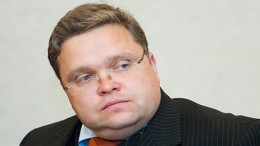Lithuania’s central bank governor: “There’s no reason to doubt euro area future”
STRASBOURG | By Alexandre Mato | After adopting the single currency on 1 January 2015, the transition period of dual circulation has finished for Lithuania, the country thus becoming the 19th euro area member. Vitas Vasiliauskas, the Governor of The Bank of Lithuania, spoke to The Corner in an exclusive interview before the ECB’s crucial meeting on 22 January, when QE could be launched.



